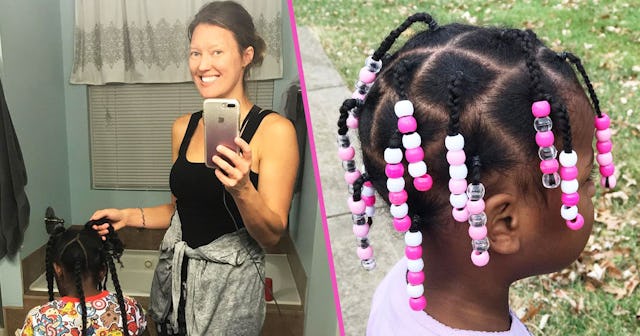When Parenting Kids Of Color, You're Always Worried That You're Not Doing Enough

When my husband and I got married, we knew we would have children one day. We had plans for him to work his way up the corporate ladder while I went to graduate school. We slept in on the weekends and traveled whenever we could—enjoying our newlywed, kid-free life.
Five years into our marriage, I was diagnosed with an autoimmune disease. It felt like everything changed. I was an insulin-dependent diabetic—which could make pregnancy complicated, if not dangerous, for both mother and child. We decided that adoption was our best family-building option.
Parenthood arrived suddenly. One Saturday we were painting our kitchen in our first home when we got the call. The social worker informed us that a baby girl was already born. Would we be interested in being considered to become her parents? We said yes, completely stunned. The day we had waited for had finally arrived.
Two hours later, we got a second phone call that we had been chosen by the baby’s birth mother. In a whirlwind, we packed up our car, installed a car seat, and traveled out of state to meet our daughter and bring her home.
At first, raising a black child wasn’t that different than raising a white child. Newborns require food, baths, diaper changes, medical checkups, and sleep. We were in a daze of joy and sleeplessness, just like any new parents. When our daughter was about five months old, we were strolling around Target when two black women approached us. They offered a warm hello, and then the older of the two looked into my eyes and said, “Your baby’s hair is dry.” I was taken aback. Did this random stranger really just insult my ability to care for my child?
The woman, seeing the look on my face, said, “Honey, I don’t care if you’re white. But your baby’s hair is dry. Come with me.” She and her friend strolled down the aisle, clearly expecting us to follow her. I was intrigued, and we followed them. Over the next hour, they showed us all around the store, pointing out products they recommended for our daughter’s hair and skin—as well as the products they told us we should definitely avoid. With each passing minute, my pride and embarrassment gave way to humility and thankfulness.
Today, my husband and I have four children, all of whom are black. We’ve been parenting for well over a decade, proudly claiming our multiracial family status. We have made plenty of mistakes—but we’ve also made great strides. However, the longer we’re parents, the more we worry.
We’ve come to understand that parents of children of color—whether the parents are biological to the children or not—are always going to worry about their kids. The reality is that parenting melanin-rich children is terrifying. Our kids aren’t safe. They don’t have white privilege to protect them, and in fact, have a lot working against them.
My husband and I have continuously worked to ensure our kids’ racial confidence. They have a mentor. My girls have a hair-braider, and my son has a barber. We attend a predominantly African American church and many of our friends are in multiracial families. My kids are fortunate that they have ongoing relationships with their first—birth and biological—families. Racial mirrors are important, especially for children who don’t have parents who racially match them.
We know how to braid and take out braids. We talk to our kids about racism and also about #BlackExcellence. They know about Dr. King, Harriet Tubman, Black Lives Matter, Serena Williams, and Juneteenth–to name a very select few. We don’t let them play with toy guns outside of our home, because we understand that what happened to Tamir Rice could happen to our children too. We listen to Ella Fitzgerald, Nat King Cole, Duke Ellington, Destiny’s Child, Kane Brown, and Mandisa, showing our children that representation matters in all genres and across decades.
Several times, I’ve been accused of focusing too much on race. Surely all this emphasis on skin color will backfire, making my kids resentful or embarrassed? I reject this notion. I’d rather be the mom who is “too much” for my children than not enough. What I worry about most is this. How much is enough?
No matter how hard we work to educate our children, we can’t protect them from all the realities of being black in America. My older two girls were four and six the first time they were called the n-word. When my son was two-years-old, he was referred to as a “cute little thug.” The white privilege we have as their parents doesn’t extend far or forever, especially not as our children get older.
I am always asking myself if what we are doing for our kids is sufficient. Where are the gaps? Right now, they are racially confident and competent. When we encounter a new situation, we often turn to our friends of color and ask what we should do. Since we are not black, didn’t grow up black, and will never be black, we don’t have the years of experience to know exactly what to do for our children.
It’s our honor to be our children’s chosen parents. Each time a person of color steps in to help us raise our children, I’m grateful. Over the years, we’ve continued to build a village of love, support, and affirmation around our children. But the realities of life as a person with brown skin is always weighing on our family.
There is so much joy in our multiracial family. But all the beauty doesn’t eradicate the fears that come with parenting kids of color. I’m left to lean on my faith and intuition, as well as our village, to guide me. Then I hope everything—and everyone—will turn out OK.
This article was originally published on